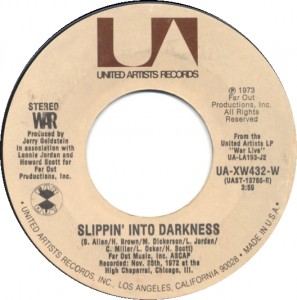
 War. Their very name indicated that their music was going to be something more than bland pop, or even the smooth soul of Motown. War was going to bring the funk, and you were going to like it … period. Fortunately we did like it plenty, and they became one of the most popular funk and soul bands of the ’70s.
War. Their very name indicated that their music was going to be something more than bland pop, or even the smooth soul of Motown. War was going to bring the funk, and you were going to like it … period. Fortunately we did like it plenty, and they became one of the most popular funk and soul bands of the ’70s.
They were the Creators originally, formed by Howard E. Scott and Harold Brown in Long Beach, CA in 1962. The pair filled the lineup with musicians who shared their love of diverse styles, including Charles Miller, BB Dickerson, and Lonnie Jordan.
The Creators recorded for Dore Records, and in 1968 they changed their name to Nightshift. Soon they were the backing band for the legendary football player Deacon Jones. It was while backing Jones at a gig at the Rag Doll in North Hollywood that producer Jerry Goldstein saw the band in 1969. Goldstein thought they’d be a good match for the former lead singer of the Animals, and soon Eric Burdon and War was born.
By then, Papa Dee Allen had joined on percussion, and Danish harmonica player Lee Oskar, who had been part of Burdon’s search for a new band, came on board as well. The band’s two horn players were dismissed by Burdon, to be replaced by Oskar’s plaintive harp wail. The first album, Eric Burdon Declares War, was released in 1970 and spawned the hit single “Spill the Wine.” The band’s second album The Black Man’s Burdon, was released later that same year and was notable for the inclusion of the War’s first recorded vocal track, “They Can’t Take Away Our Music.” War’s deal with Burdon allowed them to be signed separately as a band, and so they signed with United Artists.
The plan was for War to continue working with Burdon, while also recording on their own. It didn’t work out that way however as Burdon, citing exhaustion, left the band in the middle of a European tour in 1971. There was one more American tour, and then the parties went their separate ways. War had already released their first album without Burdon in 1971, but it went nowhere. They came back with a second effort later that year though, and All Day Music proved to be a huge hit. The album reached the Top 20 and spawned the hit singles “All Day Music,” and “Slippin’ Into Darkness”. The latter sold over one million copies and was awarded a gold disc in 1972. There was more to come however, much more.
In 1972 War released their third album, The World Is A Ghetto. It was the best selling album of 1973, selling over three million copies. They had Top 10 single smashes with “The Cisco Kid,” and the title track. In 1973 they released their next album, Deliver the Word. It was a Top 10 hit and included the hit singles “Me and Baby Brother,” and “Gypsy Man.” The soulful grit that had characterized their earlier efforts had started to fade however, and the War needed some time to consider their next move musically. They filled the gap with a the double-live album War Live, recorded in Chicago in 1974.
A year later War was back with Why Can’t We Be Friends, which found them back to their old, funky selves. The upbeat, anthemic title track and the Latin-tinged “Low Rider” emerged as huge hit singles. In 1976 the band released a greatest hits album which contained the new single “Summer.” It was their final Top 10 pop hit.
Disco was on the ascent, threatening the band’s funky, socially aware style. They changed labels, moving to MCA, and released the Galaxy album. It did some business on the R&B chart, but very little on the Pop side. The lineup began to fall apart at that point. There were solo albums, a string of departures, and an aneurysm took Papa Dee Allen while he was on stage in 1988.
As you might have guessed, the hip-hop era brought new life to the music of War, as the band’s tracks were sampled on many occasions. War got a comeback shot with Peace Sign in 1994, but the album failed to chart and what was left of the band returned to touring.
War was nominated for the Rock and Roll Hall of Fame in 2009, but they didn’t make the cut. That’s something that should be remedied soon. They were one of the biggest bands of the ’70s, and deserve a place in the august hall.
[youtube id=”OrCrDaKqS9s” width=”600″ height=”350″]




Comments